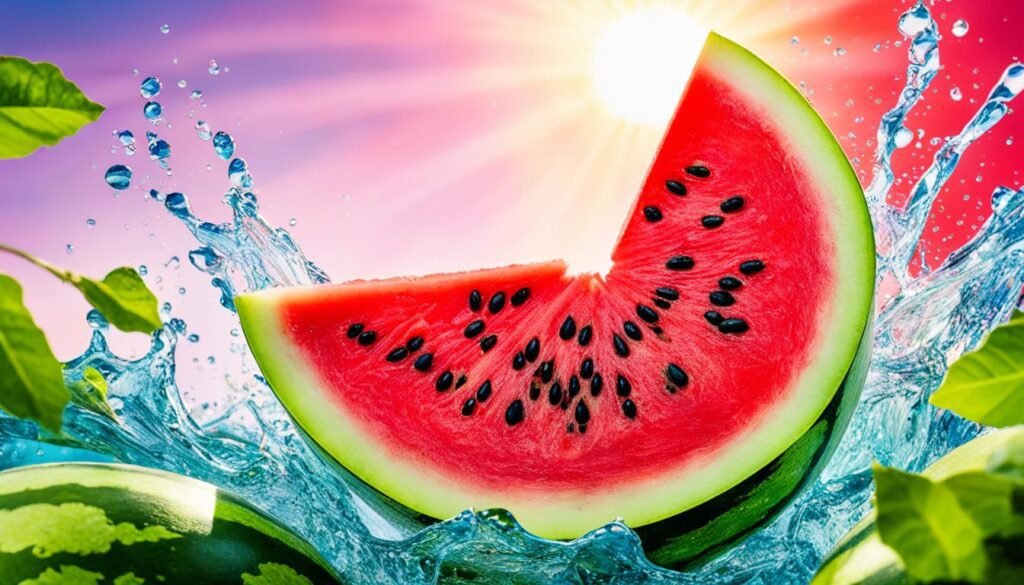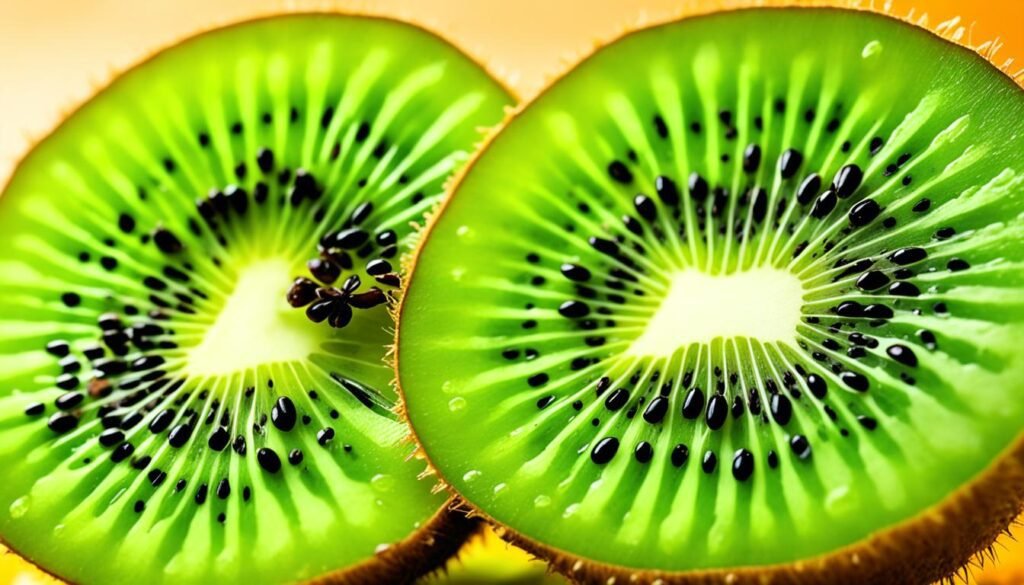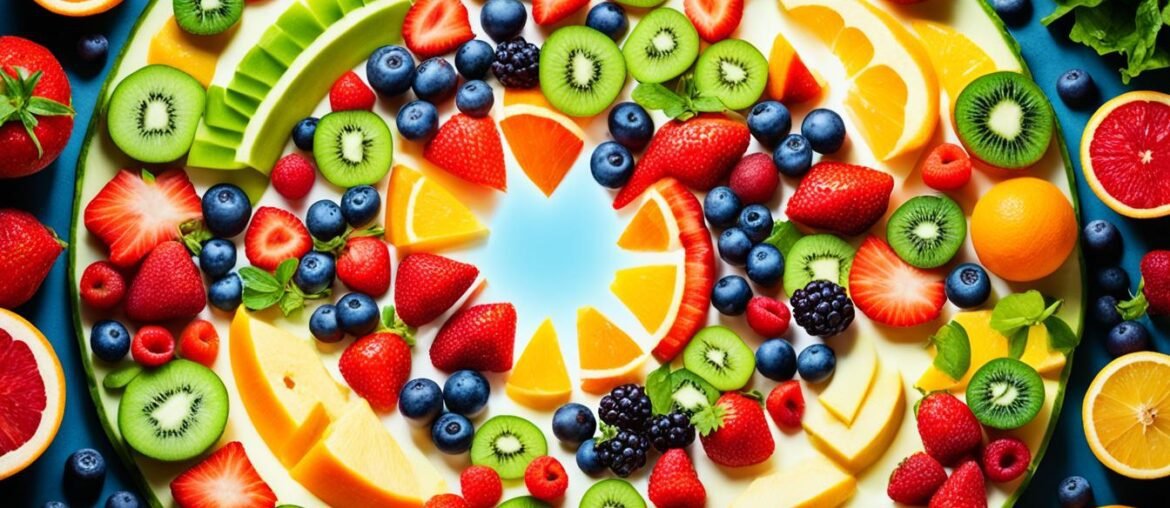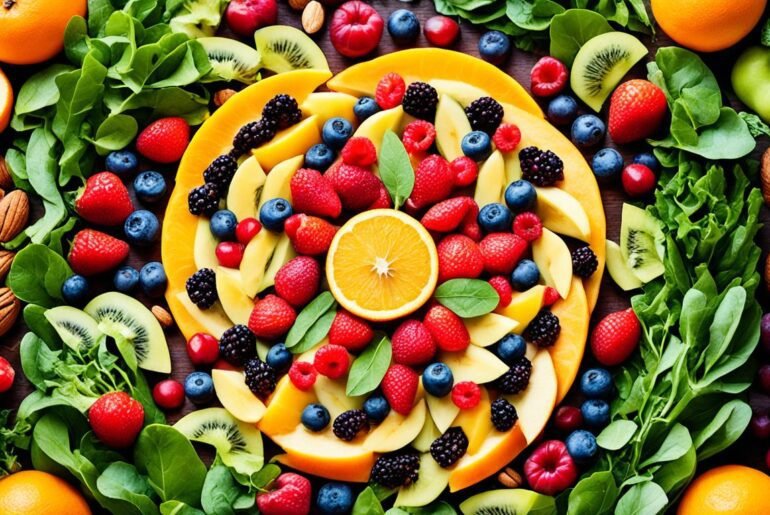Did you know that the foods you eat can have a significant impact on the health and appearance of your skin? It’s true! By incorporating certain nutrient-rich foods into your diet, you can nourish your skin from within and achieve a radiant complexion that exudes youthfulness. From improving collagen synthesis to protecting against damage, these foods offer a holistic approach to skincare that goes beyond just topical treatments.
When it comes to achieving glowing skin, a combination of both internal and external care is essential. While skincare products can help to some extent, true beauty comes from within. By fueling your body with the right foods, you can give your skin the nutrients it needs to thrive and flourish.
In this article, I will delve into the world of skin rejuvenation through natural skincare and highlight the top foods that promote a youthful glow. From anti-aging superfoods to collagen-boosting powerhouses, we will explore the benefits of incorporating these foods into your daily diet. Get ready to discover a glowing skin diet that will nourish your skin from within and leave you looking radiant!
Key Takeaways:
- By incorporating nutrient-rich foods into your diet, you can promote skin health and a youthful glow.
- These foods are rich in vitamins, antioxidants, omega-3 fatty acids, and probiotics that enhance collagen synthesis, protect against damage, and improve skin hydration.
- Skincare is not just about external treatments; nourishing your skin from within is key to achieving long-lasting results.
- A combination of internal and external care is essential for maintaining healthy and radiant skin.
- By following a glowing skin diet, you can achieve a naturally beautiful complexion and promote overall skin health.
Bell Peppers: Vitamin C-Rich Antioxidant Powerhouses
Bell peppers are an excellent addition to any diet when it comes to promoting skin health and overall well-being. These colorful veggies are not only delicious but also packed with essential nutrients, including a high concentration of vitamin C, making them powerful antioxidant powerhouses. Just half a cup of bell peppers provides over 100% of the daily value for vitamin C, making them an excellent source of this vital nutrient.
Vitamin C is a crucial antioxidant that plays a significant role in skin health. Its powerful antioxidant properties help protect the skin from harmful free radicals, which can cause damage and accelerate the aging process. By neutralizing these free radicals, vitamin C helps maintain the skin’s youthful appearance and reduces the risk of premature aging.
One of the main benefits of vitamin C is its role in wound healing. This essential nutrient helps in the formation of collagen, a protein that is crucial for maintaining the strength and elasticity of the skin. Collagen promotes the regeneration of new skin cells, allowing wounds to heal more quickly and effectively.
Additionally, vitamin C aids in the production of collagen, which is essential for maintaining skin elasticity and firmness. It promotes the synthesis of collagen, helping to improve skin texture and reduce the appearance of fine lines and wrinkles. By boosting collagen production, vitamin C can contribute to a more youthful and radiant complexion.
Not only does consuming bell peppers benefit skin health, but it also provides numerous other health benefits. Bell peppers are low in calories and packed with essential vitamins and minerals. They also contain dietary fiber, which supports a healthy digestive system and can contribute to overall well-being.
Summary:
To sum up, bell peppers are vitamin C-rich antioxidant powerhouses that offer a myriad of benefits for skin health and overall wellness. They protect the skin from damage, aid in wound healing, promote collagen synthesis, and contribute to a more youthful and radiant complexion. By including bell peppers in your diet, you can nourish your skin from within and enjoy the many health benefits they offer.
Watermelon: Hydration and Antioxidant Boost

Watermelon is not just a refreshing summer fruit; it also offers numerous benefits for your skin health and overall well-being. This hydrating fruit is packed with essential nutrients that can help maintain skin elasticity, fight inflammation, and protect against free radicals.
One of the key components of watermelon is beta-carotene, a pigment that gives the fruit its vibrant red color. Beta-carotene is converted into vitamin A in the body, which plays a crucial role in skin health and cell regeneration. Vitamin A helps maintain the skin’s moisture barrier, keeping it hydrated and plump.
In addition to beta-carotene, watermelon is also rich in vitamin C, a powerful antioxidant that aids in collagen production. Collagen is a protein that supports skin elasticity and helps reduce the appearance of fine lines and wrinkles. By boosting collagen synthesis, vitamin C can contribute to a more youthful and radiant complexion.
Furthermore, watermelon contains antioxidants that protect the skin against damage caused by free radicals. Free radicals are unstable molecules that can lead to premature aging and skin damage. The antioxidants in watermelon neutralize these harmful molecules, reducing oxidative stress and promoting healthier skin.
Another notable benefit of watermelon is its anti-inflammatory properties. Inflammation is a natural response to injury or infection, but chronic inflammation can contribute to various skin conditions, such as acne and eczema. The anti-inflammatory compounds found in watermelon can help alleviate inflammation, promoting smoother and healthier skin.
To fully reap the benefits of watermelon for your skin, it is recommended to incorporate it into your diet regularly. Enjoy it as a refreshing snack, blend it into a hydrating smoothie, or use it as a base for a delicious fruit salad. The high water content of watermelon also helps keep you hydrated, which is crucial for maintaining overall skin health.
So the next time you’re craving a sweet and hydrating treat, reach for a slice of juicy watermelon. Your skin will thank you for the hydration, antioxidants, and anti-inflammatory properties that this delicious fruit provides.
Cod: Omega-3 Fatty Acids for Healthy Skin
Cod, a delicious and versatile fish, is not only a culinary delight but also a powerhouse of nutrients that promote healthy skin. One of the standout components of cod is its high concentration of omega-3 fatty acids, which are essential for optimal skin function and appearance.
Omega-3 fatty acids are known for their numerous health benefits, and their role in skin health is no exception. These essential fats help prevent dryness and scaling of the skin, contributing to a smoother and more supple complexion. Additionally, they support the natural protective barrier of the skin, reducing the risk of moisture loss and maintaining adequate hydration levels.
Incorporating cod and other seafood rich in omega-3s into your diet can do wonders for your skin health. Not only do these fatty acids nourish your skin from within, but they also have anti-inflammatory properties that can help alleviate skin conditions such as eczema and psoriasis.
Leveraging Omega-3 Fatty Acids for Skin Health
If you’re looking to harness the benefits of omega-3 fatty acids for your skin, consider adding cod to your weekly meal plan. There are various delicious ways to enjoy this nutritious fish, including grilled, baked, or even in a flavorful fish stew.
Here’s a simple and nutritious recipe featuring cod:
Grilled Cod with Lemon and Herbs
Serves 4
Ingredients:
- 4 cod fillets
- 1 lemon, sliced
- 2 tablespoons of olive oil
- 1 tablespoon of fresh herbs (such as thyme, rosemary, or dill)
- Salt and pepper to taste
Instructions:
- Preheat your grill to medium heat.
- Brush the cod fillets with olive oil and season with salt and pepper.
- Place the fish on the grill and cook for about 4-5 minutes on each side, or until it flakes easily with a fork.
- Remove the fish from the grill and garnish with fresh herbs and lemon slices.
- Serve hot and enjoy!
Remember, maintaining a balanced diet that includes foods rich in omega-3 fatty acids, like cod, is key to promoting overall skin health. By nourishing your skin from within, you can enhance its function, combat dryness, and achieve that coveted youthful glow.
| Key Benefits of Cod for Skin Health | Omega-3 Fatty Acids | Antioxidants | Collagen Production |
|---|---|---|---|
| Prevents dryness and scaling of the skin | ✓ | ||
| Maintains skin’s natural protective barrier | ✓ | ||
| Reduces inflammation and skin conditions | ✓ |
Kefir: Probiotics for a Healthy Gut and Skin

When it comes to promoting overall health and maintaining radiant skin, a balanced gut microbiota plays a crucial role. One of the most effective ways to support your gut health is by incorporating kefir into your diet. Kefir, a fermented milk drink, is packed with probiotics that can have a positive impact on both your gut and skin health.
Probiotics are live microorganisms that confer health benefits when consumed in adequate amounts. They help maintain a balanced microbiota, the community of microorganisms living in your gut. A healthy gut microbiota is essential for proper digestion, nutrient absorption, and immune function.
By introducing kefir and its probiotic content into your daily routine, you can support the diversity and abundance of beneficial bacteria in your gut. This, in turn, can help improve digestion, strengthen your immune system, and promote a balanced microbiota.
In addition to their role in gut health, probiotics found in kefir also have significant implications for your skin health. Research has shown that a balanced gut microbiota is closely linked to skin health and appearance. An imbalance in gut bacteria can contribute to skin issues such as acne, eczema, and dryness.
Consuming kefir can help maintain a balanced gut microbiota, which can positively influence the health and appearance of your skin. The probiotics in kefir support the production of short-chain fatty acids that have anti-inflammatory properties, helping to reduce skin inflammation and irritation.
Furthermore, a healthy gut can improve nutrient absorption, ensuring that your body receives the necessary vitamins and minerals for optimal skin health. This can result in a clearer complexion, improved skin elasticity, and a more youthful appearance.
To incorporate kefir into your diet, you can enjoy it on its own as a refreshing beverage or use it as a base for smoothies, dressings, or dips. Make sure to choose plain kefir with no added sugars or flavors to reap the maximum benefits.
With its probiotic content and positive impact on gut health, kefir is a valuable addition to any skincare routine. By nourishing your gut, you can nurture your skin from within, enhancing its health and radiance.
Benefits of Kefir for Gut and Skin Health:
- Promotes a balanced gut microbiota
- Reduces skin inflammation and irritation
- Improves nutrient absorption for better skin health
- Enhances skin elasticity and appearance
To summarize, incorporating kefir into your diet can have a profound impact on both your gut and skin health. Probiotics found in kefir support a balanced gut microbiota, which positively influences digestion and nutrient absorption. This, in turn, can lead to improved skin health, reduced inflammation, and a more radiant complexion.
Walnuts: Omega-3s and Antioxidants for Vibrant Skin
Walnuts are a powerful source of nutrients that can contribute to vibrant and healthy skin. Rich in omega-3 fatty acids, antioxidants, polyphenols, and prebiotics, walnuts provide a multitude of benefits for skin health.
Omega-3 fatty acids, such as those found in walnuts, are known for their anti-inflammatory properties. By reducing inflammation, omega-3s can help manage skin conditions like acne and eczema, as well as promote overall skin health.
The antioxidants present in walnuts, including vitamin E and polyphenols, combat oxidative stress and free radicals that can contribute to premature aging and skin damage. These antioxidants help protect the skin from environmental aggressors and promote a youthful appearance.
Furthermore, walnuts contain prebiotics that support a healthy gut microbiome. The gut-skin axis is a crucial connection, as imbalances in the gut microbiota can lead to skin issues. By promoting a healthy gut, walnuts indirectly contribute to improved skin health and a clear complexion.
Including walnuts in your diet can provide the essential nutrients needed for vibrant skin and a natural glow. Consider enjoying a handful of walnuts as a snack, adding them to salads, or incorporating them into your favorite recipes to reap the benefits they offer.
The Benefits of Walnuts for Skin:
| Benefits | Description |
|---|---|
| Reduced Inflammation | Omega-3 fatty acids in walnuts help reduce inflammation and manage skin conditions like acne and eczema. |
| Antioxidant Protection | The antioxidants in walnuts combat oxidative stress and free radicals, protecting the skin from damage and signs of aging. |
| Improved Gut Health | The prebiotics in walnuts promote a healthy gut microbiome, indirectly benefiting skin health. |
Strawberries: Nutrient Powerhouses for Healthy Skin

Strawberries are not just a delicious and refreshing fruit, but they are also packed with essential nutrients that promote healthy skin. Loaded with vitamin C, antioxidants, and phenolic compounds, strawberries provide numerous benefits for your skin’s overall health and appearance.
Vitamin C is a powerhouse antioxidant that plays a crucial role in protecting skin cells from oxidative damage. It supports collagen production, a key component for maintaining skin elasticity and firmness. Additionally, vitamin C aids in wound healing, helping the skin repair itself effectively.
The antioxidants present in strawberries are essential for combating free radicals and reducing inflammation in the skin. These antioxidants, coupled with the phenolic compounds found in strawberries, possess powerful anti-inflammatory properties that repair damaged skin and contribute to overall skin health.
Incorporating strawberries into your diet can enhance your skin’s natural radiance and resilience. Whether enjoyed on their own, added to smoothies, or paired with other skin-nourishing foods, strawberries provide a nutrient-packed punch for healthy and vibrant skin.
Adding strawberries to your skincare routine can also offer topical benefits. A face mask or scrub made with fresh strawberries can help exfoliate dead skin cells, improve skin texture, and reveal a brighter complexion.
- Rich in vitamin C, supporting collagen production and wound healing
- Packed with antioxidants to combat free radicals and reduce inflammation
- Phenolic compounds repair skin damage and promote overall skin health
- Enhances natural radiance and resilience of the skin
“Strawberries are a delicious and versatile fruit that not only taste great but also provide numerous benefits for your skin. With their high vitamin C content and antioxidant properties, strawberries can help protect and repair your skin, leaving you with a healthy and radiant complexion.”
Whether consumed or applied topically, strawberries are a fantastic addition to your skincare regimen. Their nutrient-rich composition makes them a natural choice for promoting healthy and glowing skin.
Kiwi: Vitamin C and Collagen Production for Youthful Skin

Kiwi is a vitamin C-rich fruit that plays a crucial role in collagen production, which is essential for maintaining youthful and elastic skin. Vitamin C also acts as an antioxidant, protecting the skin from oxidative damage. Kiwi’s high water content helps keep the skin hydrated. Including kiwi in your diet can boost collagen production, improve skin elasticity, and promote a youthful glow.
Kiwi contains a significant amount of vitamin C, which is vital for the production of collagen. Collagen is a protein that provides structure and support to the skin, enhancing its elasticity and reducing the appearance of wrinkles and fine lines. By incorporating kiwi into your diet, you can ensure an adequate intake of vitamin C, supporting collagen synthesis and promoting youthful-looking skin.
In addition to its collagen-boosting properties, kiwi is also rich in antioxidants. These antioxidants help protect the skin from free radicals, which can cause premature aging and damage. By combating oxidative stress, kiwi can help maintain the overall health and appearance of the skin.
Moreover, kiwi’s high water content helps keep the skin hydrated. Adequate hydration is essential for maintaining skin elasticity and preventing dryness and dullness. By consuming kiwi, you can contribute to your body’s hydration levels and support skin health from within.
Incorporating kiwi into your diet is easy and versatile. You can enjoy it as a snack, include it in smoothies, or add it to fruit salads. By making kiwi a regular part of your dietary routine, you can harness the benefits of its vitamin C, collagen-boosting properties, antioxidant content, and hydration to achieve youthful, radiant skin.
So why wait? Start including kiwi in your diet today and enjoy the skin-enhancing benefits this vitamin C-rich fruit has to offer.
Conclusion
Nourishing your skin from within is essential for achieving and maintaining skin health and a youthful glow. Incorporating foods such as bell peppers, watermelon, cod, kefir, walnuts, strawberries, kiwi, grapes, tomatoes, and mangoes into your diet can provide the necessary nutrients for skin rejuvenation, natural skincare, and anti-aging.
These foods are rich in vitamins, antioxidants, omega-3 fatty acids, and probiotics that support collagen synthesis, protect against damage, and enhance skin hydration. By nourishing your skin from within, you can achieve a radiant complexion and promote long-lasting skin health.
FAQ
What are foods for skin health and a youthful glow?
Foods that promote skin health and a youthful glow include bell peppers, watermelon, cod, kefir, walnuts, strawberries, kiwi, grapes, tomatoes, and mangoes. These foods are rich in nutrients such as vitamin C, omega-3 fatty acids, antioxidants, and probiotics that can protect the skin from damage, improve collagen synthesis, and enhance skin hydration.
How do bell peppers contribute to skin health?
Bell peppers are a vitamin C-rich food that provides over 100% of the daily value for vitamin C in just half a cup. Vitamin C is a vital antioxidant that plays a significant role in skin health. It can protect the skin from UV damage, aid in wound healing, and promote collagen synthesis. Including bell peppers in your diet can enhance skin health and provide a natural glow.
How does watermelon support skin health?
Watermelon is a hydrating fruit that can support skin health and maintain skin elasticity. It is rich in beta-carotene, vitamin C, and antioxidants, which help fight inflammation and protect the skin from free radicals. Consuming watermelon regularly can help keep your skin hydrated, reduce inflammation, and promote a youthful glow.
How do omega-3 fatty acids in cod benefit the skin?
Cod is a fish that is high in omega-3 fatty acids, which play a vital role in skin function and appearance. These essential fatty acids help prevent dryness and scaling of the skin. Including cod and other seafood rich in omega-3s in your diet can improve skin health and maintain a youthful complexion.
How does kefir contribute to a healthy gut and skin?
Kefir is a fermented milk drink that is a potent source of probiotics. These beneficial bacteria can help balance the gut microbiome, which is essential for overall health and skin health. A healthy gut supports proper nutrient absorption and contributes to a balanced microbiota, which positively impacts skin health. Incorporating kefir into your diet can promote a healthy gut and radiant skin.
How do walnuts benefit skin health?
Walnuts are rich in omega-3 fatty acids, polyphenols, and prebiotics, all of which contribute to vibrant skin. Omega-3s help reduce inflammation and support skin health, while polyphenols combat oxidative stress and free radicals. Additionally, the prebiotics in walnuts promote a healthy gut, which is closely linked to skin health. Including walnuts in your diet can nourish your skin from within and promote a youthful glow.
How do strawberries contribute to healthy skin?
Strawberries are packed with vitamin C, antioxidants, and phenolic compounds that promote healthy skin. Vitamin C protects skin cells from oxidative damage, supports collagen production, and aids in wound healing. Antioxidants and phenolic compounds in strawberries have anti-inflammatory properties that can repair skin damage and improve skin health. Adding strawberries to your diet can enhance your skin’s natural radiance.
How does kiwi benefit the skin?
Kiwi is a vitamin C-rich fruit that plays a crucial role in collagen production, which is essential for maintaining youthful and elastic skin. Vitamin C also acts as an antioxidant, protecting the skin from oxidative damage. Kiwi’s high water content helps keep the skin hydrated. Including kiwi in your diet can boost collagen production, improve skin elasticity, and promote a youthful glow.
Why are foods for skin health and a youthful glow important?
Nourishing your skin from within is essential for achieving and maintaining skin health and a youthful glow. Incorporating foods such as bell peppers, watermelon, cod, kefir, walnuts, strawberries, kiwi, grapes, tomatoes, and mangoes into your diet can provide the necessary nutrients for skin rejuvenation, natural skincare, and anti-aging. These foods are rich in vitamins, antioxidants, omega-3 fatty acids, and probiotics that support collagen synthesis, protect against damage, and enhance skin hydration. By nourishing your skin from within, you can achieve a radiant complexion and promote long-lasting skin health.




